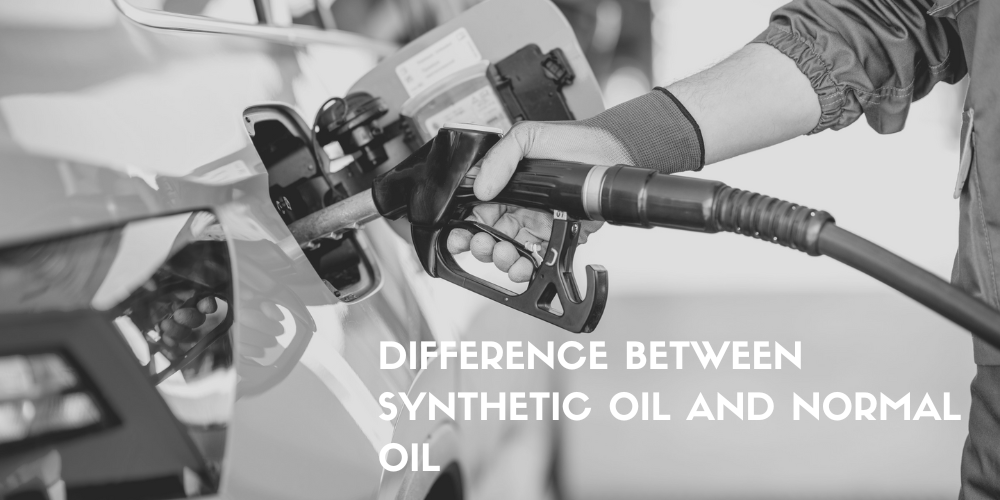Synthetic oils generally provide better performance and protection for engines compared to normal oils. Difference between Synthetic Oil and Normal Oil. Synthetic oil is a chemically engineered product, is refined from crude petroleum with varied molecule sizes
Choosing the right motor oil for your vehicle ensures long engine life and efficient operation. Synthetic oil stands out for its high level of purity and uniformity, offering superior temperature stability and engine protection under extreme conditions.
It’s designed to flow more easily at low temperatures and resist breakdown at high temperatures. Conventional oil, derived from natural crude oil, has been the traditional choice for many years and is suited for older or less demanding engines. It provides adequate lubrication but may require more frequent changes and perform poorly under harsh conditions. The decision between synthetic and conventional oil will depend on your vehicle’s requirements, driving habits, and the conditions you typically encounter.

Introduction To Motor Oils
Motor oil is vital for your car’s engine. It lubricates parts, reduces wear, and helps keep the engine clean. Understanding the different types of motor oils can improve your vehicle’s performance and lifespan.
The Role Of Oil In Engine Performance
Motor oil serves several vital functions in an engine. It lubricates the engine’s moving parts to prevent wear and tear. This oil also helps to cool the engine by carrying heat away from moving parts. Moreover, it traps and holds soot, metal filings, and other contaminants, preventing them from causing harm.
Types Of Motor Oils Available
There are mainly three types of motor oils used in vehicles:
- Synthetic Oil: Made from chemically modified materials. It provides better performance and protection at high and low temperatures.
- Synthetic Blend Oil: A mix of synthetic and conventional base oils. It offers better resistance to oxidation and maintains good performance at low temperatures.
- Conventional Oil: Derived from natural crude oil. It’s suitable for older car models with simple engine designs.
Choosing the right oil depends on your vehicle’s needs and the manufacturer’s recommendations. Always check your owner’s manual to find the best oil for your engine.
| Oil Type | Best For | Temperature Performance |
|---|---|---|
| Synthetic Oil | Newer engines, high-performance cars | Performs well in both high and low temperatures |
| Synthetic Blend Oil | Vehicles with moderate mileage | Better at low temperatures than conventional oil |
| Conventional Oil | Older cars with fewer engine demands | Good for mild weather conditions |
Each type of oil brings its own benefits and is suited for different engine types and conditions.

What Is Synthetic Oil?
Understanding the role of engine oil is crucial for any vehicle owner. Synthetic oil stands out among various types. It offers enhanced performance and protection for engines. Let’s dive into what makes synthetic oil unique.
Creation Process
Synthetic oil goes through a complex engineering process. Unlike conventional oil, it’s not simply refined from crude oil. Manufacturers break down and rebuild petroleum molecules. This creates a more uniform oil structure. The result is a product tailor-made for high-demand engines.
- Starts with a base of pure, high-quality crude oil
- Chemically altered to improve molecular consistency
- Customized additives enhance performance
Key Ingredients And Properties
Synthetic oils are packed with high-performance ingredients. These give them superior properties over conventional oils. The additives and base oils in synthetics offer:
| Ingredient | Property |
|---|---|
| Base Oils | Stability at high temperatures |
| Viscosity Modifiers | Consistent flow in different conditions |
| Detergents | Clean engine components |
| Dispersants | Prevent sludge formation |
| Anti-wear Additives | Protect engine parts |
These ingredients ensure engines run smoother for longer. They reduce wear and tear. They also help in keeping the engine clean from harmful deposits.
Understanding Conventional Oil
When choosing engine oil, understanding the basics of conventional oil is critical. This type of oil, mineral oil, is the traditional choice for many vehicle owners. Let’s delve into what makes conventional oil a staple in the automotive industry.
Source And Formulation
Conventional oil comes from crude oil pulled from the earth. Refineries process this natural resource to remove impurities. They also blend in additives to meet specific engine requirements. These additives enhance the oil’s ability to:
- Resist oxidation
- Minimize wear
- Keep engines clean
Despite these enhancements, conventional oil has a simpler composition compared to synthetic options.
Common Uses And Limitations
Conventional oil suits a range of everyday vehicles, particularly older models with simple engine designs. It’s also more budget-friendly, making it a popular choice for regular oil changes. Common uses include:
- Passenger cars
- Light trucks
- Motorcycles
However, it has its limitations. Conventional oil breaks down faster under extreme temperatures and heavy use. This means it may not be ideal for:
| High-Performance Vehicles | Heavy-Duty Applications |
|---|---|
| Sports cars | Towing and hauling |
| Racing vehicles | Commercial trucks |
Owners of such vehicles might need to consider synthetic oil for better performance and protection.

Comparative Analysis: Performance
Performance is a crucial factor when choosing between synthetic and conventional oil. This comparative analysis delves into how both oils handle different aspects of performance, such as temperature resistance and engine cleanliness.
Temperature Resistance
Synthetic oil outshines conventional oil in temperature extremes. It retains its viscosity and doesn’t break down in high heat. This means a smoother engine performance even on hot days. In cold weather, synthetic oil flows better, ensuring easy starts and immediate protection.
| Synthetic Oil | Normal Oil |
|---|---|
| Stays stable at high temperatures | May thin and degrade in heat |
| Flows easily in cold weather | Thickens, making engine starts harder |
Engine Cleanliness
Synthetic oils are designed to keep engines cleaner. They contain fewer impurities than conventional oils, leading to less sludge and deposit buildup. This means engines run more efficiently and last longer.
- Synthetic oil: Reduces sludge buildup
- Normal oil: Prone to leaving deposits
By maintaining a cleaner engine, synthetic oil helps to ensure that all the moving parts within the engine operate smoothly, minimizing wear and tear over time.
Longevity And Change Intervals
Let’s talk about how long synthetic oil and normal oil last in your car. Many people wonder how often they should change their oil. The answer can save you time and money.
Duration Between Oil Changes
Synthetic oil lasts longer than normal oil. This means fewer trips to the mechanic. Here’s a quick look:
- Normal Oil: Change every 3,000 to 5,000 miles.
- Synthetic Oil: Good for 7,500 to 15,000 miles.
Remember, check your car’s manual. It tells you the best time to change your oil.
Cost Implications Over Time
At first glance, synthetic oil seems pricier. But let’s break it down:
| Oil Type | Short Term Cost | Long Term Savings |
|---|---|---|
| Normal Oil | Less expensive per change | More changes needed |
| Synthetic Oil | More expensive per change | Fewer changes save money |
Think long-term. Synthetic oil’s fewer changes mean less money spent over time.
Environmental Impact
When choosing between synthetic and conventional oil, environmental effects matter. Both oils have unique impacts on our planet. Understanding these helps us make eco-smart choices.
Eco-friendliness Of Synthetic Vs. Conventional
Synthetic oil boasts greater efficiency. It reduces engine friction. This means less fuel consumption and fewer emissions. Conventional oil, in contrast, has a shorter life. It leads to more frequent oil changes. This results in greater waste and environmental strain.
- Synthetics often use fewer natural resources over time.
- Conventional oils rely heavily on crude oil, impacting ecosystems.
Disposal And Recycling Challenges
Both synthetic and normal oils pose disposal challenges. Improper disposal can harm water sources and wildlife.
| Type of Oil | Disposal Challenge |
|---|---|
| Synthetic Oil | Specialized recycling required due to chemical composition. |
| Conventional Oil | More frequent changes increase the volume of waste oil. |
Recycling programs exist, but not everyone uses them. Synthetic oil can be re-refined multiple times. This reduces the need for new oil. Yet, both types must be recycled properly to protect the environment.

How long will synthetic oil last?
This is a common question among car owners seeking to optimize their maintenance schedules. Synthetic oil typically boasts a longer lifespan than conventional oil, thanks to its advanced formulation and resistance to degradation. On average, synthetic oil can last anywhere from 7,500 to 10,000 miles before needing a change, though this duration can vary based on factors like driving habits, vehicle age, and environmental conditions. Regularly monitoring your oil level and condition and following the manufacturer’s recommendations will ensure your engine stays well-lubricated and protected for miles to come.
Is synthetic oil better
- Introduction to Synthetic Oil: Synthetic oil stands as a pinnacle in lubrication technology, offering numerous advantages over traditional mineral oils. Its superior properties make it a compelling choice for discerning vehicle owners seeking optimal engine performance and longevity.
- Enhanced Lubrication: Synthetic oil boasts a precisely engineered molecular structure that provides unparalleled lubrication to engine components. This results in reduced friction, minimizing wear and tear while maximizing efficiency.
- Improved Engine Performance: The exceptional lubricating properties of synthetic oil contribute to smoother engine operation and enhanced performance. Its ability to withstand high temperatures and extreme conditions ensures consistent performance even under strenuous driving conditions.
- Extended Engine Life: With synthetic oil’s ability to maintain its viscosity and integrity over an extended period, engines experience reduced stress and wear, ultimately leading to a longer lifespan. This translates to fewer mechanical issues and lower maintenance costs in the long run.
- Better Fuel Efficiency: Synthetic oil’s low viscosity and reduced friction characteristics enable engines to operate more efficiently, resulting in improved fuel economy. This not only saves money on fuel expenses but also reduces carbon emissions, contributing to a cleaner environment.
- Cold Weather Performance: Unlike conventional oils that thicken in cold temperatures, synthetic oil remains fluid, ensuring easy engine startups and optimal lubrication even in freezing conditions. This feature is particularly beneficial in regions with harsh winter climates.
- Resistance to Oxidation and Sludge Formation: Synthetic oil’s superior resistance to oxidation and sludge formation keeps engines cleaner and minimizes the buildup of harmful deposits. This helps maintain engine cleanliness and prevents blockages in vital oil passages.
- Compatibility with Modern Engine Technologies: Synthetic oil is formulated to meet the demands of today’s high-performance engines, including turbocharged, direct-injection, and hybrid powertrains. Its advanced chemistry ensures compatibility with modern engine materials and technologies.
- Reduced Environmental Impact: By promoting longer engine life, reducing fuel consumption, and minimizing emissions, synthetic oil contributes to a greener automotive landscape. Its longevity and efficiency help conserve natural resources and reduce the environmental footprint of vehicle operation.
- Conclusion: In summary, synthetic oil offers a multitude of advantages that make it a superior choice for vehicle maintenance. From enhanced engine performance and longevity to improved fuel efficiency and environmental sustainability, the benefits of synthetic oil are undeniable. Making the switch to synthetic oil is not just a smart investment in your vehicle’s health but also a conscious step towards a cleaner and more efficient future.
Can i put synthetic oil in my car after using regular oil
Transitioning from regular to synthetic oil in your car is feasible and can offer numerous benefits. Synthetic oil provides superior lubrication and engine protection compared to conventional oils, thanks to its precisely engineered molecular structure. When switching from regular oil to synthetic, ensuring that your engine is compatible with synthetic oil is typically the case for most modern vehicles. Before making the switch, it’s recommended to consult your car’s owner’s manual or a trusted mechanic to confirm compatibility and any specific recommendations. Once confirmed, you can safely transition to synthetic oil during your following oil change, reaping the rewards of improved engine performance, longevity, and fuel efficiency that synthetic oil provides.
Making The Right Choice
Choosing between synthetic oil and normal oil can be tricky. Both have benefits. Your car’s health depends on this choice. Let’s dive into the factors you should consider and what’s best for your vehicle type.
Factors To Consider
- Engine Compatibility: Check your vehicle’s manual for the recommended oil type.
- Driving Conditions: Synthetic oil excels in extreme weather and heavy usage.
- Oil Change Frequency: Synthetic oil lasts longer, meaning fewer changes.
- Cost: Normal oil is cheaper upfront, but synthetic could save money over time.
- Environmental Impact: Synthetic oil can be more eco-friendly.
Recommendations Based On Vehicle Type
| Vehicle Type | Recommended Oil Type |
|---|---|
| High-Performance | Synthetic Oil |
| Everyday Commuter | Depends on Manufacturer |
| Older Models | Normal Oil |
| Heavy-Duty Trucks | Synthetic Oil |
Remember, always refer to your car’s manual before making a switch. Your car’s make, model, and age are key in this decision. A trusted mechanic can also provide personalized advice. Choose wisely for your engine’s longevity and performance.
Can i put synthetic oil in my car after using regular oil
In rare cases, transitioning to synthetic oil may unveil pre-existing leaks within aging engines, owing to its detergent properties. While synthetic oil is renowned for its cleansing prowess, its advanced formulation can inadvertently expose hidden leaks as it removes deposits and residue accumulated over time. However, it’s crucial to emphasize that synthetic oil isn’t the root cause of these leaks; it acts as a revealing agent, highlighting underlying issues within the engine’s seals or gaskets.
Despite the potential for leak detection, synthetic oil remains a preferred choice for many due to its numerous benefits. Synthetic oil offers enhanced protection against wear, oxidation, and thermal breakdown, ensuring optimal engine health and longevity. Its low viscosity also aids in improving fuel efficiency by reducing friction within the engine, leading to better mileage and reduced emissions.
Moreover, synthetic oil’s extended drain intervals alleviate the hassle and cost associated with frequent oil changes, making it an attractive option for drivers seeking convenience and cost-effectiveness. Synthetic oil minimizes downtime and maintenance expenses by prolonging the time between oil changes, allowing drivers to enjoy uninterrupted driving experiences.
However, drivers must be aware of the potential risks of switching to synthetic oil, particularly in older vehicles with worn or deteriorated engine components. Synthetic oil’s detergent properties can unearth existing leaks, but proactive maintenance and regular inspections can help mitigate these risks, ensuring a smooth transition to synthetic lubrication.
Furthermore, synthetic oil’s compatibility with various engines makes it a versatile choice for drivers of different vehicle makes and models. Whether you drive a modern sedan or a classic car, synthetic oil offers reliable performance and protection, safeguarding your engine against the rigors of daily driving and prolonged use.
Difference between Synthetic Oil and Normal Oil
Synthetic oil molecules are more uniform in shape with fewer impurities and better properties than conventional oil molecules. In most cases, synthetic oil has better extreme high temperature and low temperature performance. Synthetic oils are generally formulated with higher performing additives.
Frequently Asked Questions
Is Synthetic Oil Better Than Regular Oil?
Synthetic oil typically outperforms regular oil in engine protection, efficiency, and longevity. Its advanced formulation ensures better performance in extreme temperatures and reduces engine wear over time.
Is synthetic oil environmentally friendly?
While synthetic oil offers performance advantages, its production process raises environmental concerns due to chemical synthesis and resource consumption.
What Is The Disadvantage Of Synthetic Oil?
The main disadvantage of synthetic oil is its higher cost compared to conventional oil. It may also require specialized disposal methods due to its chemical composition.
What Happens If You Put Regular Oil Instead Of Synthetic?
Using regular oil instead of synthetic can reduce your engine’s efficiency and longevity. Regular oil may degrade faster under extreme conditions, leading to more frequent changes and potential wear on engine components. Always check your vehicle’s manual for recommended oil types.
Is synthetic oil better for high-mileage vehicles?
Yes, synthetic oil is often recommended for high-mileage vehicles due to its superior engine protection and resistance to wear, helping prolong the engine’s lifespan
Can synthetic oil cause leaks?
In rare cases, switching to synthetic oil may reveal pre-existing leaks in older engines due to its detergent properties. However, synthetic oil itself does not cause leaks.
When Should You Not Use Full Synthetic Oil?
You should not use full synthetic oil if your vehicle’s manufacturer specifically recommends against it. Older engines with high mileage may also not benefit from synthetic oil due to potential leaks. Always check your owner’s manual for guidance.
Conclusion
Understanding the differences between synthetic and conventional oil is crucial for any vehicle owner. Synthetic oil offers enhanced performance and longevity, tailoring to modern engine demands. On the other hand, conventional oil provides a cost-effective solution for less intense driving conditions.
Choosing the right oil can significantly impact your engine’s health and your driving experience. Always consider your vehicle’s specific needs and manufacturer recommendations to make the best decision for your engine’s lubrication.
